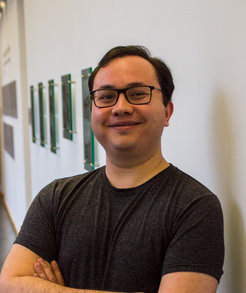Richard Lincoln awarded the Stefan W. Hell Nobel Laureate Fellowship
The postdoctoral scientist receives the fellowship to pursue his research on photoactivatable fluorophores and labelling strategies for MINFLUX nanoscopy at the MPI for Medical Research in Heidelberg.
“I am very grateful for the fellowship, and I very much look forward to continuing my research with the interdisciplinary team we have at the MPIMR,” said Richard Lincoln after receiving the fellowship at this year’s General Assembly of the Max Planck Society in June. It brings with it a two-year employment contract and research-related funds of up to 30,000 € every year.
Richard Lincoln’s research focuses on the development of photoactivatable fluorophores and labelling strategies for MINFLUX nanoscopy. “I am fascinated by the complex machinery of life that can be seen through the lens of a microscope, and the intricate details that can be visualized with fluorescence nanoscopy. By expanding the molecular toolbox of fluorophores and labels at our disposal, we can reveal new secrets, and I am excited to see what will be discovered next,” says Lincoln.
Fluorescent probes and appropriate labelling strategies are critical for successful fluorescence nanoscopy methods. Therefore, improvements in the fluorophores are one of the major keys to boosting the performance of both established and newly-developed super-resolution methods. Lincoln explains his approach: “I combine principles of physical chemistry with rational synthetic design to create molecules that can be triggered with light to assemble into fluorophores during imaging. This strategy distinguishes itself by eliminating the need for special imaging buffers, and renders molecules that are highly compact and cell membrane permeable.”
About the recipient:

Richard Lincoln was born in Canada and obtained his B.Sc. (Hons.) in Chemistry from Acadia University, where he worked with Prof. Sherri McFarland studying the photochemistry of ruthenium organometallic complexes. He then joined the research group of Prof. Gonzalo Cosa at McGill University to pursue his PhD in chemistry. His doctoral research focused on developing fluorescence probes for studying the chemistry and biology of lipid peroxidation. He joined the MPIMR in 2019 as a postdoctoral researcher in the Optical Nanoscopy Department.
